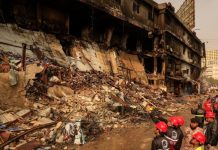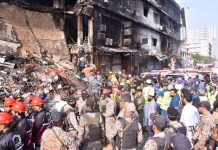
ISLAMABAD: Minister of State for Interior Shehryar Afridi said that activists of some political parties, including the Pakistan Muslim League-Nawaz (PML-N), were behind the incidents of violence across the country during the recent three-day protest against acquittal of Christian woman Aasia Bibi in a blasphemy case.
Speaking in the Senate, he said Shahbaz Sharif, Bilawal Bhutto-Zardari and other leaders of opposition parties had suggested that force should not be used against the protesters, but regretted that workers of the parties giving such advice were involved in violence.
Mr Afridi said investigations were under way and made it clear that those who had taken the law into their own hands and were involved in damaging and torching public and private properties would not be spared and a strict action would be taken against them. He said there would be no compromise with the people who challenged the writ of the state.
“We showed Tehreek-i-Labbaik Pakistan (TLP) the footage of the people being violent on the streets and they disowned them,” he said, adding that he would shortly brief Prime Minister Imran Khan on the meeting with the TLP leadership.
About the agreement between the government and the TLP leadership to end the protest against Aasia’s acquittal by the Supreme Court, Mr Afridi said the state had signed the document because ‘Naya Pakistan’ did not believe in bloodshed.
Shortly after the apex court’s verdict on Oct 31, the TLP had blocked roads in major cities of the country for three days, condemning the prime minister, the army chief and the judges who had acquitted Aasia Bibi.
The TLP had called off the protests after striking a deal with the government. Under the five-point agreement, the government said it would not object to the review petition filed against the acquittal of the woman.
Claiming that not a single drop of blood was spilled during the protests, Mr Afridi said the state would not use the stick against the TLP leadership but embrace and engage them in dialogue.
He chided those criticising the TLP leaders for using derogatory language against the judiciary, military and government and said they had apologised for it in the agreement. It was the right of every citizen to move a review petition against a court verdict, he added.
He called for drawing red lines for lawmakers as well, saying that national interest should not be damaged at any cost. “God forbid, if Pakistan is placed on the FATF blacklist on the grounds of the violence footage and the speeches made in parliament, who will be responsible?” he asked. He said no one should act in a manner that damaged the country’s interests and made it a laughing stock.
Minister for Science and Technology Azam Swati defended the Supreme Court judgement in the Aasia Bibi case, saying the FIR in the case had been lodged five days after the incident and the eyewitnesses did not record their statements. He said there were contradictions in the statements about the basis for quarrel between Aasia and other women, as well as the number of persons present in the jirga where the Christian woman was said to have confessed to committing blasphemy.
Mr Swati was on his feet when PML-N Senator Mushahidullah Khan pointed out lack of quorum.
Senate Chairman Sadiq Sanjrani, who appears to have his own rules to follow, ordered quorum bells to be rung for three minutes, instead of five minutes as mentioned in Rule 5 of Rules of the Procedure and Conduct of Business in Senate 2012. A count was made again after the bells stopped ringing and after finding that less than one-fourth members were present in the house, the chairman read out the prorogation order.
At the outset of proceedings, the opposition protested and staged a walkout from the house against the absence of ministers. When Leader of the House in the Senate Syed Shibli Faraz said they were attending a cabinet meeting, Chairman Sanjrani observed that the house proceedings were more important than the cabinet.
Senator Mir Hasil Bizenjo of the National Party said that the remarks made during the recent TLP sit-in were a challenge not only for the government, but also for the state. He regretted that a group had taken control of the federal capital.
Mr Bizenjo said surrender before such elements was more dangerous than bloodshed. He also asked the government to reveal the terms on which loans were being obtained from Saudi Arabia, China and the International Monetary Fund.



